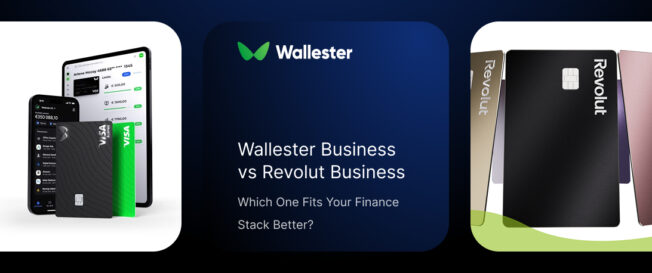For companies looking to modernise their expense management and gain firmer control over corporate spend, choosing the right financial platform is an essential but often complicated process.
In the EEA, two popular options are Wallester Business and Revolut Business. Both platforms offer card issuance, team access, and expense tracking features. However, their underlying models (and what they’re optimised for) are not exactly the same.
Below is a direct comparison across key features to help you decide which solution best suits your business.
Company overview
Wallester Business
- Founded: 2016
- HQ: Tallinn, Estonia
- Market: EEA + UK
Services: Visa corporate cards, expense tracking, multi-user dashboards, API integrations
Wallester Business is an expense management platform centred around fast and scalable card issuance. Companies can issue 300 virtual Visa cards for free, with unlimited physical cards, all synced to a real-time expense management dashboard. Additionally, Wallester Business offers API-based accounting integrations, supports 10 currencies with no internal FX fees, and enables onboarding that’s usually completed within hours.
Revolut Business
- Founded: 2015
- HQ: London, UK
- Market: UK + EEA
- Services: Business accounts with multi-currency IBANs, corporate cards, FX, invoicing, payroll, analytics
Revolut Business is a digital business banking platform offering accounts with IBANs, SEPA support, invoicing, global transfers, and savings options. It’s structured around tiered plans: Basic (€10/month), Grow (€30), Scale (€90), and Enterprise (custom). Access to features such as FX limits, card controls, and analytics can vary by plan.
Further Reading: Wallester Business vs Pleo: Which Spend Tool Works Best in 2025?
Feature comparison
| Feature | Wallester Business | Revolut Business |
| Business Accounts & IBAN | EUR EE IBAN for SEPA; tied to cards | Multi-currency business accounts (IBANs) |
| Virtual & Physical Cards | Unlimited cards (300 virtual free) | Included, but limited per plan |
| Card Issuance & Limits | 300 free virtual Visa cards; no issuance fees | Volume depends on plan; some cards included |
| Cashback & Rewards | No cashback, but savings via free issuance | Cashback and rewards on paid plans |
| Pricing & Fees | Free to use; custom pricing for advanced tools | Starts at €10/month; features gated by tier |
| Expense Management | Real-time control, budget rules, receipt automation | Available on all plans; advanced features from €30/month |
| Accounting Integrations | API-based, customisable | Native integrations: Xero, QuickBooks, Pennylane, Sage |
| Customer Support | Dedicated business support, fast response | 24/7 chat support; account management on Enterprise only |
| Currency Exchange | No FX fees on transfers across 10 currencies | Interbank FX with monthly free allowance; fees apply beyond limit |
| Onboarding | Account setup within 1 hour | Varies; can take several days depending on business type |
| User Scaling | Unlimited users (admins, accountants, employees) | Unlimited team access, but feature controls vary by plan |
Pros & Cons
Wallester Business – Pros:
Scalable card issuance with no subscription required
300 virtual cards free, unlimited users
No FX fees on internal transfers (10 currencies)
Real-time expense visibility and full spend control
Onboarding typically completed within hours
Cons:
No business IBAN – not a full bank replacement
Revolut Business – Pros:
Full business accounts with IBANs and global transfer support
FX at interbank rates within monthly limits
Extras like savings, analytics, invoicing, and payroll
Native integrations with major accounting tools
Cons:
Subscription required (starting at €10/month)
Tier-based feature gating – FX limits, transfers, controls all depend on plan
Slower onboarding for some entities
Card issuance and spend controls limited by plan
Which one is right for your business?
It all depends on your priorities. If you’re looking for seamless card issuance, real-time expense tracking, and cost control, Wallester Business offers a more efficient and flexible model. Issuing hundreds of cards, assigning users without restrictions, and managing budgets centrally – all of this can be done without upfront fees.
Revolut Business is a broader financial platform offering IBANs, invoicing, and treasury tools, but that also means navigating plan tiers and user limits. In short, it’s a good fit for companies looking for a banking partner, but less suitable for those whose main goal is card-based expense control at scale.

Final thoughts
Revolut Business and Wallester Business serve different priorities. Revolut offers a digital banking experience, but adds complexity through tiered access and subscription fees. Wallester, on the other hand, focuses primarily on scalable corporate card infrastructure with real-time visibility and no upfront cost.
For finance teams that value speed, flexibility, and transparency, Wallester Business is the smarter choice.
Explore Wallester Businessand see how your team can simplify corporate spend – fast.


